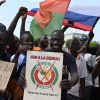By Julie Anderson / World-Herald staff writer
Willie Barney
Everyone knows the statistics.
Black men suffer disproportionately from poverty, school failure, family instability, unemployment, incarceration and homicide.
But on Friday, the focus wasn’t on the numbers but on the best ways to fix them.
Groups from across the community, as well as three key leaders from New York and Chicago, gathered at the Conference on Black Male Achievement.
The event, which continues today at Goodwill Industries, 4805 N. 72nd St., is presented by Black Men United, Nebraska Families Collaborative, 100 Black Men of Omaha, Banister Leadership Academy and Goodwill.
“I want to talk about best practices, what’s working locally and nationally, and then tie them together,” said Willie Hamilton, executive director of Black Men United. “How do we change the trajectory of our black boys and men?”
That solution, he said, will mean coming together, putting aside differences and coming up with a strategic plan to change that trajectory.
“When black boys achieve, the city achieves, literally,” Hamilton said.
A number of efforts already are coming together. President Obama earlier this month announced an initiative called “My Brother’s Keeper” to bring foundations and companies together to test strategies to keep young blacks in school and out of the criminal justice system.
Currently, eleven cities, including Omaha, are working on comprehensive plans to address black male achievement, said Willie Barney, president of the Empowerment Network. The effort came after the National League of Cities hosted its own Black Male Achievement Conference.
“We’re looking at who’s doing what, so we can work together,” Barney said.
Organizers have counted 865 black, school-age males in a target area in north Omaha. The goal, he said, is that 100 percent of them graduate and go on to some kind of post-high school education.
“We don’t want to lose a single young man,” Barney said.
Also participating in the Omaha conference were Phillip Jackson, executive director of the Black Star Project in Chicago; Kenneth Braswell, executive director of Fathers Incorporated in Albany, NY; and Shawn Dove, manager of the Open Society Foundation’s Campaign for Black Male Achievement, described as the largest of its kind in the country.
Jackson said he came to learn how to take initiatives to scale.
His organization already sponsors a number of programs focused on education and parental involvement, including a mass black male graduation ceremony, the Million Father March back-to-school event, Take a Black Male to Worship and a Father’s Club that organizes free monthly events for families. Omaha groups already have sponsored the march and worship efforts.
“Success is not one program,” he said. “It’s the layers of successful programs.”
Braswell said Fathers Incorporated aims to promote responsible fatherhood and mentoring. It also contracts with the National Responsible Fatherhood Clearinghouse, part of the U.S. Department of Health and Human Services. He has produced a documentary called “Spit’N Angry — Venom of a Fatherless Son,” about the importance of fathers.
Creating success for black men will help move the needle for families, he said. For 40 years, the focus has been on helping single moms. But there hasn’t been a focus on supporting men so that they can support their families to the level they can go off public assistance programs.
He said more cities across the country are hosting summits like the one in Omaha. Bringing people together is a start. But it needs to happen frequently and come with incremental — and measurable — goals.
“This is an excellent start,” he said. “But it can’t end here.”














